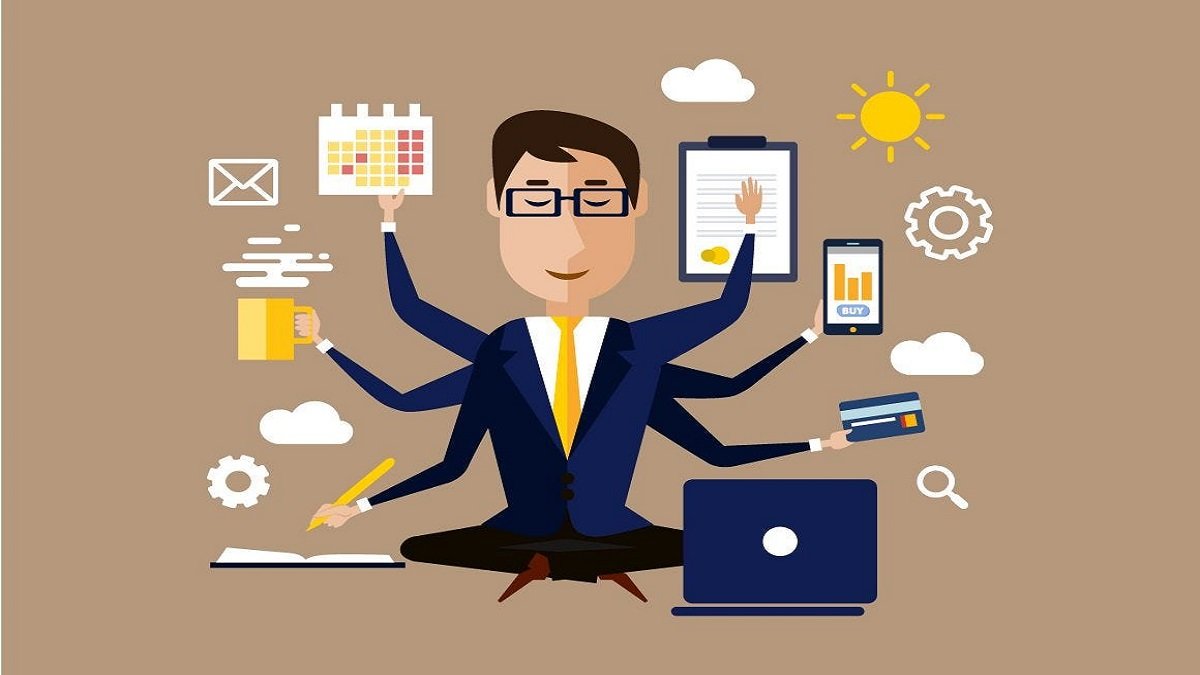There are moments when you have a ton of work to complete yet feel like time is running out. Your anxiety may get to the point that you are unsure of where to begin. Maybe despite your best efforts, you were unable to do all of the tasks promptly, and as a result, they are piling up in front of you. Put an end to your worries. We are here to provide you with Tips for Getting Work Done Faster.
Sometimes, after putting in a lot of effort, you believe everything will work out. You aren’t entirely incorrect, however. However, you should learn to work smarter, not harder, if you want to do more in less time. I’ll cut the conversation short and go right to the advice.
Work More Effectively And Faster With These Tips

1. Work When It’s Most Productive For You
Working at the time when you are most productive is one of the Tips for Getting Work Done Faster. Which are you—a night owl or an early riser? If you’re unsure, it could be time to find out and use this knowledge to enhance your workflow. Everybody has a distinct daily routine that suits them. Scientists speculate that age, heredity, or other variables may contribute to these differences.
Surprisingly, you shouldn’t always do your most critical task in the morning just because you’re an early riser. Your “non-optimal” periods may be the most productive for you when it comes to creativity and problem-solving, according to studies. It turns out that when you’re more psychologically exhausted, you may be more creative. Try experimenting with several daily routines until you identify one that suits your needs.
2. Plan in Advance
If you don’t have a clear strategy for the day, you can find yourself thinking about what has to be done, calculating how long it will take, and establishing goals for the end of the day during the first few hours of the day. One of the greatest Tips for Getting Things Done to make the most of your time is to plan ahead. It is beneficial to show up at work prepared to work right immediately.
Keep a note of this in a journal, on paper, or even in a project management software application, and refer to it often while working. Realism should be a primary factor when creating plans. Don’t establish deadlines or unachievable objectives for yourself.
3. Break Down Bigger Tasks To Smaller Ones
Have you ever been afraid to begin a significant assignment, such as finishing a significant project or submitting your taxes? We are more inclined to be afraid of tasks if we believe we lack the necessary skills or if we believe they will be painful and take a very long time.
Procrastination may result from this anxious emotion, claims Psychology Today. Dividing your large job into smaller, more manageable tasks is a smart task management strategy to help you avoid this fear-based procrastination. Create a weekly schedule and a “to-do list” to assist you in completing these minor objectives.
If you have to write a ten-page report, for instance, break it down into manageable steps: make an outline first, then write each part starting with the introduction and ending with the conclusion, proofread it, and then send it off. It’s far less scary to think, “Today, I need to make an outline,” than it is to think, “I need to write a ten-page report this week.”
4. Avoid Multitasking
Focusing on a single task is one of the Tips for Getting Work Done Faster. It’s common to see multitasking listed as a critical talent on resumes, and executing many tasks at once may undoubtedly be beneficial. But in reality, there’s a better approach to do your work than this. Studies have shown that juggling many things reduces your productivity.
According to one study, multitasking lowers productivity by 40%, while according to another, it lowers intellect by 17%. These two indicate that you will not be able to complete your assignment on time. You’ll do better if you concentrate on one thing at a time and make an effort to stay away from interruptions and distractions.
It’s worth considering if it’s more crucial to do one work to a high level or numerous jobs to an average standard when you have a lot of critical activities on your to-do list. If the latter, your best bet is to make sure you provide your best effort and concentrate on one goal at a time.
You may maximize your time by focusing entirely on one activity, which makes it simpler to adopt the proper attitude and rhythm needed to do the work quickly and effectively.
5. Smart Work
Consideration should be given to smart work when discussing productivity. The outcomes of a task seldom match the amount of work you put into it. Even with your best efforts, if a job takes too long, it’s an indication that your hard work isn’t doing much good.
Setting priorities for your job and allotting enough time to do it are key components of smart working. Positivity and consistency in your output are more likely to occur when you work with healthy habits. Formulating a daily plan that you can stick to is a healthy habit and a crucial part of hard effort. It is one of the most vital Tips for Getting Work Done Faster.
6. Complete Non-Essential Chores in Ten Minutes or Less
An extremely successful productivity-boosting Tips for Getting Things Done is to aim to finish tedious and trivial chores in ten minutes or less. In addition to clearing out your daily to-do list, doing these little but irksome chores quickly gives you a feeling of satisfaction that spurs you on to further activities and duties.
Early in the day, recognizing and prioritizing these repeated chores is critical to success. You can concentrate on doing each activity quickly and effectively without becoming sidetracked or overwhelmed if you give yourself a 10-minute time restriction.
By completing these little activities on time, you will be able to devote more time and effort to more difficult and high-priority jobs, which will increase your total productivity. Additionally, removing these tedious chores from your list of things to do makes your workload more manageable and orderly. It also gives you a psychological lift since a crowded to-do list tends to cause worry and anxiety.
7. Organize Your Work Area To Increase Productivity
You’ll need a workstation that encourages concentration if you want to finish tasks quickly. This is particularly true while working from home, since there are many potential distractions. Make sure your workstation at home is pleasant in order to get the most out of it. A good workstation and chair should be purchased and placed in a peaceful, distraction-free setting.
Your workstation should ideally have a closed door to prevent unauthorized access without a knock. If at all possible, stay away from common areas like the kitchen and living room. Additionally, make sure you have the appropriate tools and technologies.
To improve speed and stability if you’re having trouble with a sluggish connection or poor Wi-Fi signal, consider connecting your computer to the network via an Ethernet cable. Invest in high-quality headphones if you often have video conferences, and if you’re in a noisy setting, think about using noise-canceling software.
8. Avoid Procrastination
Productivity is harmed by procrastination. Given the abundance of possible diversions in the contemporary workplace, it’s an especially risky trap for workers in the twenty-first century.
Identify the unwanted interruptions that are generating the most trouble if you find yourself delaying and losing important time throughout the day. Technology will be the greatest offender for a lot of individuals.
Adopt a zero-tolerance policy for distractions unrelated to your job, whether it’s social media, friend texts, or the newest applications on your phone. Don’t add any social bookmarks or private chat programs to your work computer, and turn off your phone if you can. This is one of the great Tips for Getting Work Done Faster.
Personal Wellbeing is Linked To Productivity
Putting one’s health first is among the crucial Tips for Getting Work Done Faster. Deep breathing exercises and other basic mindfulness techniques help reduce stress and improve attention and mental clarity.
You can maintain optimal performance throughout the day by taking even brief pauses for your mental wellness. It’s crucial to create wholesome daily routines. The keys to sustaining high energy and attention include eating healthfully, exercising often, and getting adequate sleep.
For example, research indicates that those who get between seven and nine hours of sleep each night do better when it comes to problem-solving and memory retention than those who get less sleep. Taking good care of your body and mind creates a solid foundation that enhances your whole life, not just at work. Make use of these routines to maintain a balance between your well-being and productivity.
FAQ
Q: What speeds up your work?
A: When using the Pomodoro method, you dedicate 25 minutes of your attention to a single job, followed by a 5-minute break. According to psychologists, the Pomodoro approach is effective because assigning tasks a time restriction makes them seem more doable. This makes you more determined to finish them so you may get your reward—your break.
Q: I work so slowly; why is that?
A: A worker may be slower than their coworkers for a variety of reasons. It may be a lack of enthusiasm for the job, an obsession with perfection, a poorly managed workflow, or just a simple ignorance of the activities’ deadlines or importance.
Q: Which is better, working smarter or harder?
A: Your objectives will be attained more quickly if you combine hard effort with smart work. Though smart work can also help you save time and energy, hard labor is still necessary since it helps you concentrate. Hard work enables you to concentrate on the most crucial aspects of the process, while smart work will assist you in concentrating on a certain job.











